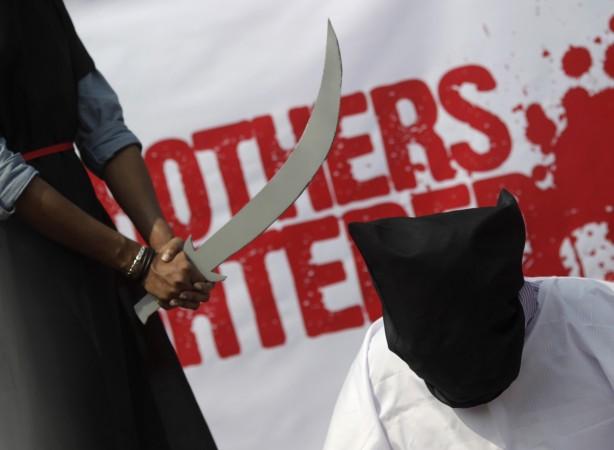
Saudi Arabia, an ally in the United States-led coalition fighting the Islamic State in Iraq and Syria, seems to have a lot in common with the common enemy – both mete out inhuman punishments, with an uncanny similarity in the form of penalty for each crime.
In the recent weeks, Saudi Arabia has been in the line of fire from human rights activists for the beheading of a woman accused of murdering her daughter and for the public flogging of blogger Raif Badawi, who got relief from the lashing this Friday for the second time as the deep gashes from the first 50 lashes refused to heal.
ISIS is known to use similar forms of punishment within their stronghold, and Western nations have often cited this brutality to justify their war against the group.
But a closer look at the punishments in Saudi Arabia and the Islamic State shows both adopt similar methods to punish crimes that range from alcohol consumption to adultery, according to the Middle East Eye.
For example, both follow the practice of stoning married individuals accused of adultery to death and 100 lashes for the unmarried ones; both endorse capital punishment for blasphemy and homosexuality; and both order amputation of limbs for crimes such as stealing.
Documents show IS & Saudi Arabia prescribe near-identical punishments for crimes http://t.co/ZoVVUqeHMn #ISIS #Saudi pic.twitter.com/kUEXqXCJiv
— Middle East Eye (@MiddleEastEye) January 20, 2015
While the chart doesn't refer to 'beheadings' under the 'death' punishment for murder in Saudi Arabia, a recent video of a Burmese woman being publicly beheaded in Mecca by Saudi authorities for allegedly killing her step-daughter sparked global outrage.
ISIS had released its guide for punishments last month, in which it fixed punishments for 'hadd' crimes, actions for which are said to be described in the religious scriptures. However, many of the brutal punishments are not applied in several Islamic nations apart from Saudi Arabia the Middle East Eye reported.
According to Washington Post, the chart showing similarities in punishment in Saudi Arabia and the Islamic State is 'broadly accurate'.
However, despite the similarities, the two sides remain arch enemies, with ISIS leader Abu Bakr al-Baghdadi calling for the caliphate to expand into Saudi Arabia and the latter working on a 'Great Wall' to keep out the jihadists.

















